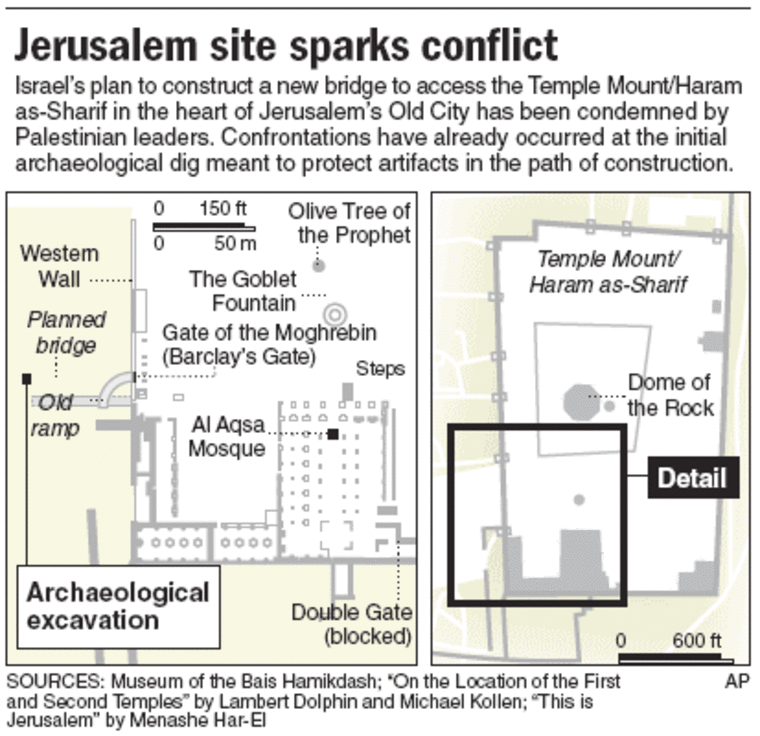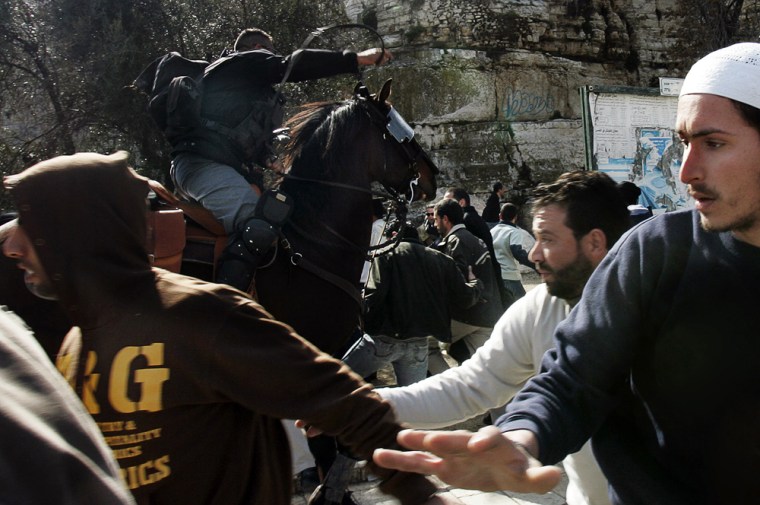Sporadic Palestinian protests, including a rock-throwing attack on a busload of Canadian tourists, broke out in Jerusalem and the West Bank on Saturday over Israel’s construction of a ramp leading to a flashpoint holy site.
The demonstrations came the day after Israeli police raided the mosque compound, firing tear gas and stun grenades at rioting Muslims. Protests have spread throughout the world as Muslim leaders accused Israel of trying to damage the Islamic shrines.
Israel denies the repair work will come anywhere near the holy site, known to Muslims as the Noble Sanctuary and to Jews as the Temple Mount.
Tour bus pelted with rocks
In Jerusalem, a few dozen Palestinian teenagers threw stones at Israeli security forces at the walled Old City, burning an Israeli flag at one point. At the Mount of Olives holy site, Palestinians pelted a Canadian tour bus, but no one was injured.
“We were just driving and all of a sudden a bunch of kids started picking up rocks and whatever they could get their hands on and started throwing it at the bus,” said Dave Wood, one of the tourists. “This is our first day in the Holy City and it was quite disturbing to say the least.”
Israeli police arrested a total of 17 protesters in the Jerusalem protests that were “relatively quiet,” police spokesman Shmuel Ben-Ruby said. The Israeli crews did not work on the ramp Saturday, the Jewish Sabbath.
Clashes with soldiers
In the West Bank town of Bethlehem, dozens of Palestinian youths threw rocks at Israeli soldiers guarding a checkpoint into Jerusalem. The soldiers detained 30 protesters, the army said.
In a similar protest in the West Bank city of Hebron, police responded with tear gas and rubber-coated bullets. No injuries were reported in either demonstration.
In anticipation of further protests in Jerusalem on Sunday when the work will resume, police will maintain a beefed-up force and restrictions at the mosque compound, barring all Muslim men under the age of 45 from praying there, Ben-Ruby said.

A holy site for two faiths
On Friday, about 200 riot police streamed onto the compound shooting stun grenades and tear gas when some of the 3,000 Muslim worshippers there threw rocks at them. Clouds of tear gas rose into the sky and sharp booms pierced the air.
The compound — a catalyst for earlier rounds of Israel-Palestinian fighting — is home to the third holiest site in Islam and is believed to be the site where the Prophet Muhammad ascended to heaven.
Jews venerate the compound as the site of their biblical temples, and one of its outer walls — known as the Western Wall — is the holiest site in Judaism.
The Israelis say the purpose of the construction project is to build a new walkway leading to the mount to replace a ramp that was damaged in a 2004 snowstorm. But the Palestinians say the excavations are actually attempts to damage their shrines.
Palestinians accuse Israelis of spoiling site
Israeli officials reject that accusation and say they are not digging under the compound since the work is about 200 feet away from the mount.
The Arab League chief said Saturday the dig reflects “Israeli attempts” to tighten control over Jerusalem and urged the international community to intercede.
“There are plans to change the features of the city,” Amr Moussa said in a statement distributed to the Arab representatives at an emergency League meeting in Cairo. The statement said the construction “is threatening the security and stability in the region.”
Jordan and Egypt — Israel’s sole Arab peace partners and key U.S. allies in the region — have demanded the Jewish state stop the work, as did Indonesia, the world’s most populous Muslim nation.
Malaysia, which chairs the 57-member Organization of Islamic Conference, urged the international community to intervene immediately to stop the “illegal activities.”
